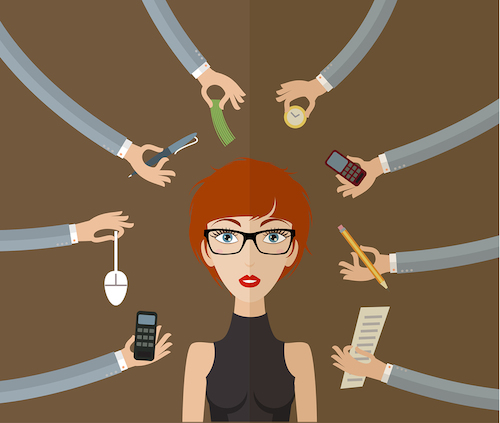Boy, are you busy. You’re marking up the draft of a brief while at the same time listening to a muted conference call, checking your email and scarfing down a kale salad. Thank goodness you are a great multitasker – you’re getting so much accomplished!
Or, perhaps not.
It turns out that multitasking, which seems to be a job requirement for lawyers, is harmful to your brain, counterproductive in that it actually creates distraction and lack of focus, and is a misnomer because it may not even exist in the first place.
The Multitasking Myth Debunked
You’re Not Multitasking. While there are some things you can do simultaneously, for example, talking and walking or eating a sandwich and listening to music, human beings cannot do two things at once when those two things require conscious thought and are controlled by the same part of the brain.
You may be able to walk and chew gum at the same time because those are automatic behaviors, but have you ever tried to talk on the phone while composing an email? Those are both writing and speech-related activities competing for attention from the same location in the prefrontal cortex. You may think you’re multitasking but, according to Earl Miller, a professor of neuroscience at MIT, research proves that you are very rapidly shifting back and forth from one activity to another rather than doing both of them simultaneously. In other words, you are not multitasking – you’re actually task-shifting. Consider this analogy from neuropsychologist William Stixrud. “The brain,” he says, “ is a lot like a computer. You may have several screens open on your desktop, but you’re able to think about only one at a time.”
You’re Not More Productive. If you think your impressive juggling act is making you more efficient, think again. According to the American Psychological Association, brief mental blocks created by shifting between tasks can cost as much as 40% of productive time. Moving back and forth between several activities means your attention is being spent on the act of switching gears and you never truly focus on one activity or the other.
Negative Side Effects of Multitasking
It Has Negative Effects on Brain Function. The illusion of productivity isn’t the only bad news. Research conducted at Stanford University in 2009 indicates that the constant shifting from one area of focus to another actually makes “champion multitaskers” worse at both filtering out irrelevant information and using working memory, two critical task for lawyers.
It Increases Mistakes. A 2010 study by French research institute Inserm suggests that the two different sides of the brain can each handle a discrete task (by switching back and forth quickly), but that once you starting adding more than two tasks to the mix, the brain simply can’t manage them, resulting in an increase in mistakes.
It Interferes with Your Social Skills. Dr. Patty Ann Tublin, a relationship and communications consultant, claims that multitasking can even lower your emotional intelligence or, at the very least, call it into question because multitasking lowers your social awareness and self-awareness, two critical components of emotional intelligence.
It Reduces Enjoyment and Stresses You Out. When you never truly concentrate on one activity at a time, you don’t have the luxury of drinking in any one event and experiencing enjoyment. All of that frantic back and forth keeps your heart rate high; even worrying about the consequences of trying to do too many things at once can cause tension.
The Antidote to Multitasking
The bottom line is this: You’re not actually multitasking, your efficiency is down, your stress is up, and your brain is taking a beating.
So what’s a frazzled lawyer to do? At the risk of stating the obvious, stop multitasking! Slow down, stay focused and make every effort to do one thing at a time. You will likely get a lot more done in a shorter amount of time, reduce mistakes and increase your mental well-being.
[widgets_on_pages id=”Opt-In for Blog Posts”]
